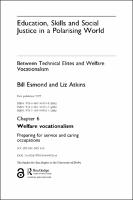Chapter 6 Welfare vocationalism
Proposal review
Preparing for service and caring occupations
Abstract
In contrast to the technical elites, specific groups of young people – women, those from the lowest social classes, and those with the poorest educational experiences – are already likely to engage with poorer quality further education programmes, those associated primarily with low-paid and precarious employment. They undergo workplace learning as a much more limited experience, studying in vocational areas many of which already include substantial work placements as part of many learning programmes. Childcare, which already requires longer periods in the workplace than are stipulated by T Level requirements, is a prime example. Their time in the workplace is conceptualised as learning to interact with service users and to acquire the personal attributes of workers in these occupations. Placements can sometimes be seen as the routine work of ‘caring’ and service occupations, and young people interviewed often expressed impatience and frustration, linked to preparation for routine employment. The socialisation of these groups appears a key premise of the expectations and rationale offered by policymakers for recent reforms.
Keywords
education, elites, justice, social skills, polarizing, welfare, worldDOI
10.4324/9781003049524-6ISBN
9780367503338, 9780367503345, 9781003049524Publisher
Taylor & FrancisPublisher website
https://taylorandfrancis.com/Publication date and place
2022Grantor
Imprint
RoutledgeClassification
Education


 Download
Download